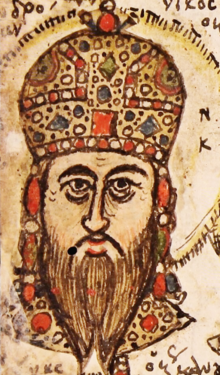Our website is made possible by displaying online advertisements to our visitors.
Please consider supporting us by disabling your ad blocker.
Andronikos IV Palaiologos
| Andronikos IV Palaiologos | |
|---|---|
| Emperor and Autocrat of the Romans | |
 15th-century portrait of Andronikos IV (from a 15th-century codex containing a copy of the Extracts of History by Joannes Zonaras) | |
| Byzantine emperor | |
| Reign | 12 August 1376 – 1 July 1379 |
| Predecessor | John V Palaiologos |
| Successor | John V Palaiologos |
| Proclamation | 1352 as co-emperor |
| Byzantine emperor in Selymbria | |
| Reign | May 1381 – June 1385 |
| Born | 11 April 1348 Constantinople, Byzantine Empire (now Istanbul, Turkey) |
| Died | 25 or 28 June 1385 (aged 37) Selymbria, Byzantine Empire (now Silivri, Istanbul, Turkey) |
| Burial | |
| Spouse | Keratsa of Bulgaria |
| Issue | John VII Palaiologos |
| House | Palaiologos |
| Father | John V Palaiologos |
| Mother | Helena Kantakouzene |
Andronikos IV Palaiologos or Andronicus IV Palaeologus (Greek: Ἀνδρόνικος Κομνηνὸς Παλαιολόγος;[1] 11 April 1348 – 25/28 June 1385[2]) was the eldest son of Byzantine Emperor John V Palaiologos.[3] Appointed co-emperor from 1352, he had a troubled relationship with his father: he launched a failed rebellion in 1373, usurped the throne in 1376–1379, and remained engaged in a bitter struggle with his father, John V, until his death in 1385.[2] This civil war depleted Byzantium's scarce resources and greatly facilitated the Ottoman conquest of the Balkans, most notably through the cession of Gallipoli by Andronikos. He was also the father of John VII.[4]
- ^ PLP, 21438. Παλαιολόγος, Ἀνδρόνικος IV. [Κομνηνός].
- ^ a b Sode, Claudia; Takács, Sarolta (2017-05-15). Novum Millennium: Studies on Byzantine History and Culture Dedicated to Paul Speck. Taylor & Francis. ISBN 978-1-351-91427-7.
- ^ Zachariadou, Elizabeth A. (1977). "John VII (Alias Andronicus) Palaeologus". Dumbarton Oaks Papers. 31: 339–342. doi:10.2307/1291412. ISSN 0070-7546. JSTOR 1291412.
- ^ Magdalino, Paul (1978). "Byzantine Churches of Selymbria". Dumbarton Oaks Papers. 32: 309–318. doi:10.2307/1291427. ISSN 0070-7546. JSTOR 1291427.
Previous Page Next Page


